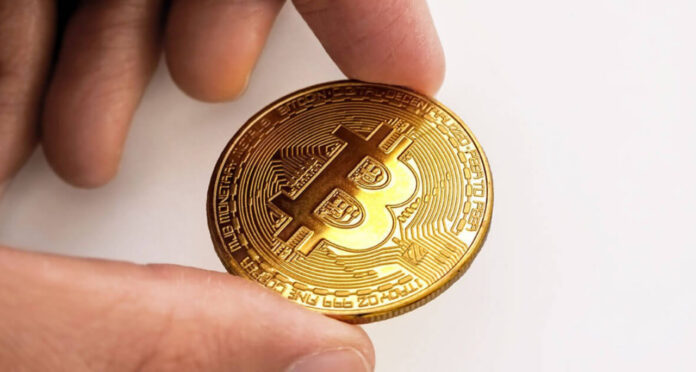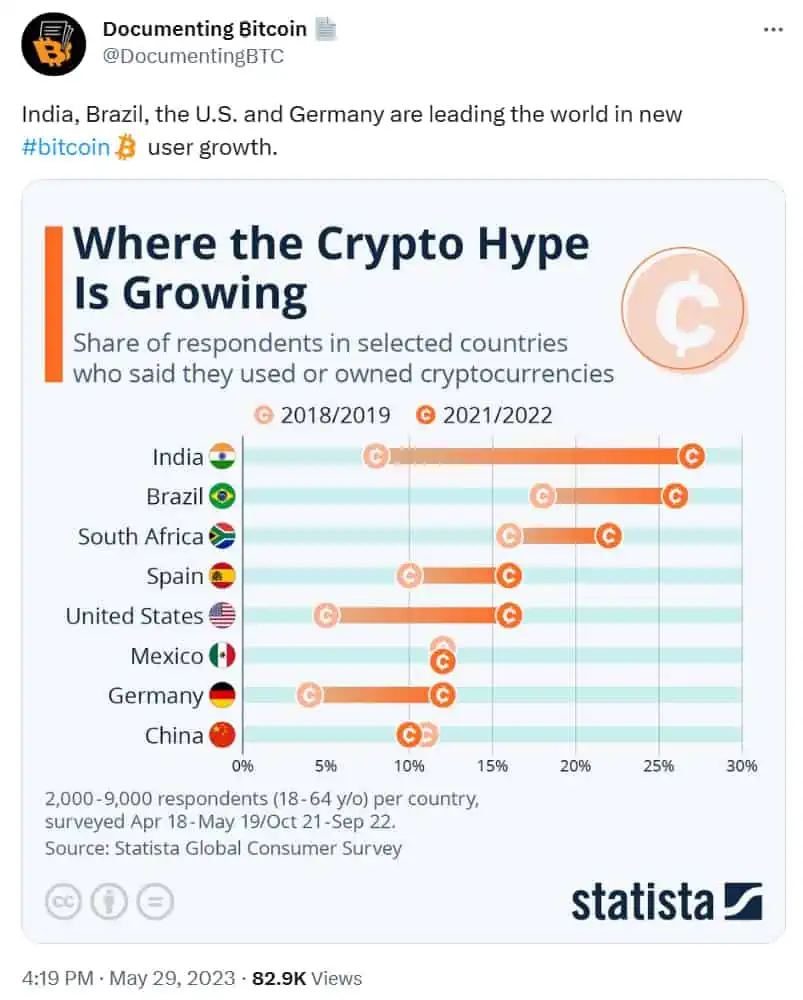
India, Brazil, the United States, Germany and South Africa are the countries with the highest growth in the number of new Bitcoin users, according to data from Statista.
Over the past 4 years, Bitcoin has seen unprecedented growth in terms of valuation and adoption. The cryptocurrency’s market capitalization has grown exponentially, as has its trading volume and the number of users worldwide.
In this regard, the research and statistics platform for market data Statista had published a report on the adoption of Bitcoin. Titled “Where the Crypto Hype is Growing”, the Statista report points out that India, Brazil, the United States, Germany and South Africa are the five countries where Bitcoin has been most widely accepted by their populations.
The data shows that between 2018-2019 and 2021-2022, the number of Bitcoin users grew significantly in these countries, which lead the global adoption of the cryptocurrency.

According to Statista data, Bitcoin adoption in India tripled in the period in question. The cryptocurrency was also well received in Brazil, the United States, Germany and South Africa.
Other countries where Bitcoin, the world's first successful cryptocurrency and the one that currently leads the market, saw significant growth in its adoption levels were Spain, Mexico and China, although in the latter two the adoption of BTC was much more modest, according to the data.
What drives Bitcoin adoption?
Bitcoin adoption in India appears to have been boosted by the national government's decision to lift its bans on virtual assets. As reported by this outlet, in 2022 India lifts its ban on cryptocurrencies and proposed a new tax regime. Also, at the beginning of 2023, the country's government recognized that, despite the risks that must be controlled through regulation, Cryptocurrencies can boost the financial sector.
India’s decision to regulate the crypto industry has seen Bitcoin and other cryptocurrencies’ trading volumes and adoption levels skyrocket in recent years.
On the other hand, Brazil It is another of the jurisdictions that maintains a favorable legal environment with cryptocurrencies, being the first country in Latin America to authorize the launch of cryptocurrency exchange-traded funds or ETFs and in passing a bill to Legalize Bitcoin paymentsOne of its main cities, Rio de Janeiro, even aspires to become the crypto capital of the region.
In the case of United States, although the SEC's constant attacks on cryptocurrencies are undermining innovation and driving crypto companies out of the country, Americans are increasingly interested in these digital assets. This was reported by JP Morgan in a study carried out in December, in which it revealed that the use of cryptocurrencies in the United States had grown by 400% since 2020.
About German, one of the 27 countries that make up the European Union, this has been classified by Coincub as one of the world's leading cryptoeconomies and, in fact, the most favorable in terms of regulation and taxation, financial infrastructure and interest in cryptoassets by the population. In this country, the German Federal Financial Supervisory Authority o BaFin classifies cryptocurrencies as financial instruments, so investors and traders can trade bitcoins as long as the established rules and laws are followed.
Finally, in South Africa, Bitcoin is playing a key role in helping citizens Overcome financial obstacles and protect your value.
The bullish cycle that cryptocurrencies experienced in 2021 was crucial for the acceptance and adoption of Bitcoin. In addition, rising inflation and decisions such as those made by El Salvador, to declare Bitcoin its legal tender, have also served as catalysts to boost the use and adoption of this cryptocurrency around the world.
Bitcoin, an alternative to fiat money
Bitcoin is expanding around the world as an alternative to fiat moneyThis cryptocurrency allows its users to send and receive transactions, acquire goods, products and services, save value, carry out international operations and even invest, serving as a reserve asset for the long-term refuge of value. Therefore, the growing adoption of Bitcoin in the world reflects innovation and the need for people to adapt to the technological changes that are taking place today.
Being a decentralized digital currency, Bitcoin does not depend on any government or central authority for its operation, allowing people to send and receive payments and transactions freely, without intermediaries or geographical restrictions.
Continue reading: Bitcoin became a trend on Twitter when its price exceeded $28.000



